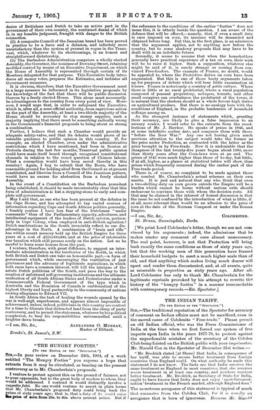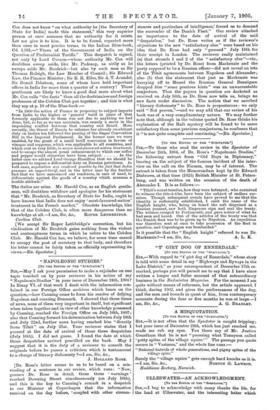[To THE EDITOR OP TRIP "SPECTATOP..1
Sm,—The traditional reputation of the Spectator for accuracy of comment on Indian affairs must not be sacrificed, even in the sacred cause of Cobdenite "Free-trade." Please permit an old Indian official, who was the Press Commissioner of India at the time when we first forced our system of free imports upon India in the years 1877-78, to protest against the unpardonable mistakes of the secretary of the Cobden Club being foisted on the British public with your imprimatur. Mr. Harold Cox in the Spectator of December 31st writes "Mr. Brodrick stated [at Share] that India, in consequence of her tariff, was able to secure better treatment from foreign countries than England could. On what authority he made this statement I do not know. The facts are that India receives the same treatment as England in most countries, that she receives worse treatment in at least one country, and nowhere receives better treatment. Mr. Brodrick, as Secretary of State for India, ought to have known that India does not enjoy most-favoured- nation' treatment in the French market, although England does."
The monstrous arrogance of this statement is typical of much that emanates from the Cobden Club, for it is usually an
arrogance that is born of ignorance. Because Mr. Harola Cox does not know "on what authority he [the Secretary of State for India] made this statement," this very superior person at once assumes that no authority for it exists.
Let me give it to him. It is to be found, repeated more than once in most precise terms, in the Indian Blue-book, Cd. 1,931,—" Views of the Government of India on the Question of Preferential Tariffs." This despatch is signed, not only by Lord Curzon—whose authority Mr. Cox will doubtless sweep aside, like Mr. Podsnap, as airily as he sweeps aside Mr. Brodrick—but also by such men as Sir Thomas Raleigh, the Law Member of Council ; Sir Edward Law, the Finance Minister ; Sir E. R. Elles, Sir A. T. Arundel, Sir Denzil Ibbetson, some of whom have held important offices in India for more than a quarter of a century These gentlemen are likely to know a good deal more about what Mr. Cox calls "the facts" than all the doctrinaires and foreign professors of the Cobden Club put together ; and this is what they say at p. 10 of the Blue-book :—
" In 1900 the action of France in proposing to subject imports from India to the higher or 'general' tariff in place of that formerly applicable to them was not due to anything we had done, but, so far as we can ascertain, was merely a move in the impending conflict between that country and Brazil. More recently, the threat of Russia to enhance her already exorbitant duty on Indian tea followed the passing of the Sugar Convention Bill in the Imperial Parliament. In the former case we were enabled, by the grant of a small tariff concession in favour of vinegar and copperas, which was applicable to all countries, and which cost us very little, to secure most-favoured-nation treatment, and to escape the almost penal enhancement to which our coffee and pepper would otherwise have been subject In the latter case we advised Lord George Hamilton that we should be prepared to impose a differential duty on Russian petroleum. In both cases, negotiation was rendered possible by the fact that India possesses an import-tariff, and in the latter case by the further fact that we have announced our readiness, in case of need, to differentiate against the goods of a country which assumes a hostile attitude."
The italics are mine. Mr. Harold Cox, as an English gentle- man, will doubtless withdraw and apologise for his statement that "Mr. Brodrick, as Secretary of State for India, ought to have known that India does not enjoy most-favoured-nation' treatment in the French market." Obsolete knowledge, like that of the Cobden Club, is often more dangerous than no
knowledge at all.—I am, Sir, &a., ROPER LETHBRIDGE.
[We accept Sir Roper Lethbridge's correction, but his vindication of Mr. Brodrick gains nothing from the violent and contemptuous terms in which he refers to the Cobden Club. Mr. Harold Cox has, we believe, for some time ceased to occupy the post of secretary to that body, and therefore his letter cannot be fairly taken as officially representing its views.—En. Spectator.]















































 Previous page
Previous page